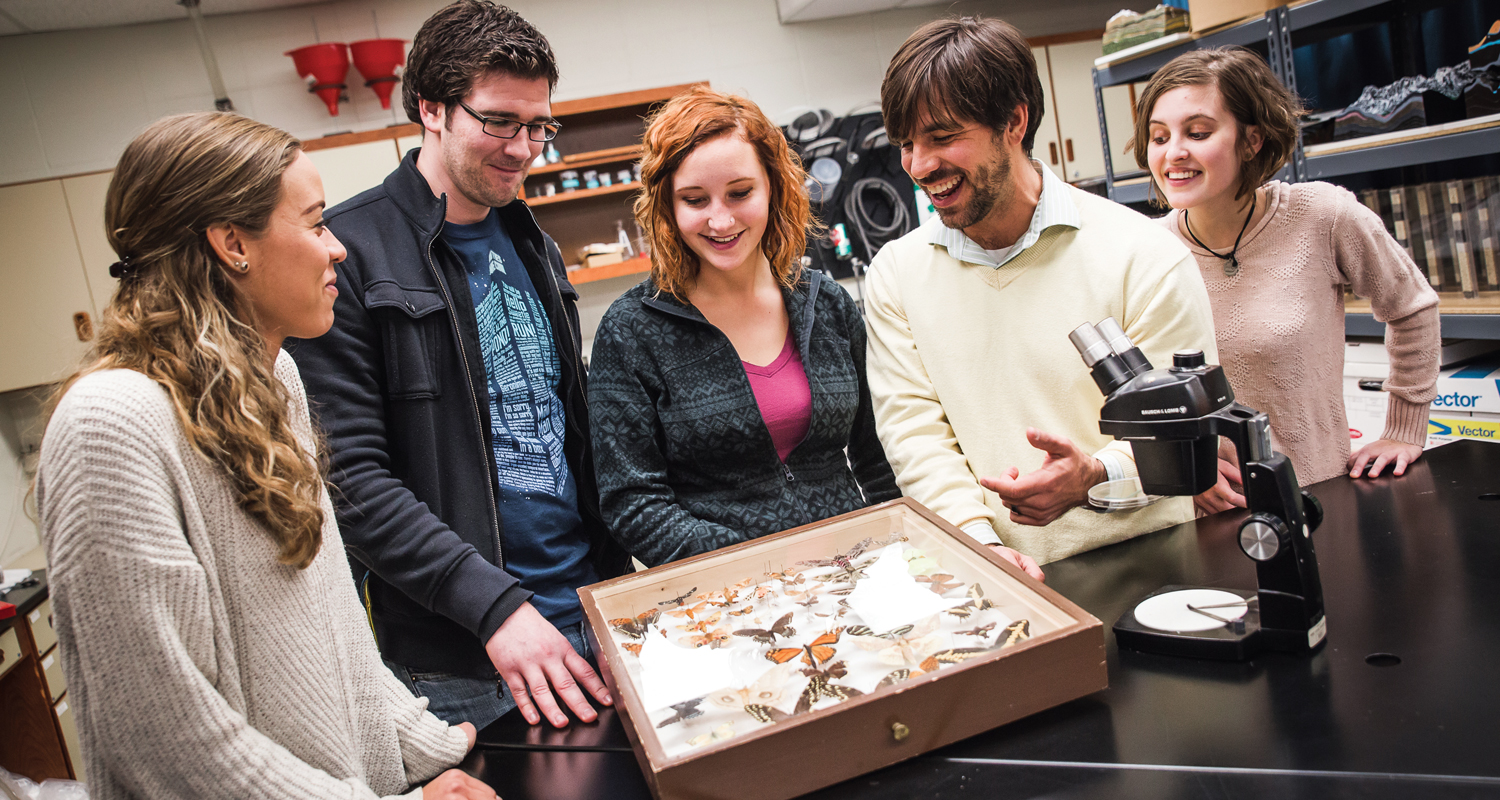Grants are important to the mission of Kent State University at Stark. The more funding we receive, the more we can:
- Provide students with diverse learning experiences
- Develop innovative teaching methods
- Pursue fascinating research, often involving our students
- Offer quality student services
- Strengthen ties with the community
- Enhance our picturesque campus
Read on to learn how some recently received grants are positively affecting our campus.
SCANNING ELECTRON MICROSCOPE: $161,039
The National Science Foundation awarded Assistant Professor of Biology Matthew Lehnert funds toward the purchase of a scanning electron microscope (SEM). The microscope will be the first of its kind at a Kent State regional campus.
“With magnification abilities up to 300,000 times, we’ll be able to magnify very small things, such as viruses,” says Lehnert. “Other microscopes at Kent State Stark can only magnify up to 1,000 times.”
SEMs help researchers study organisms and other objects at nano- and micro-scales (very small scales). Lehnert will use the SEM to further his study of insect mouthparts, for example, to determine how structures, such as microbumps on butterfly mouthparts, channel liquids for efficient fluid uptake abilities. Other researchers will use the SEM for close up studies of fossils, minerals, bacteria, viruses and more.
The SEM also will provide:
- 3D imaging, so investigators can do topographical mapping of a structure.
- Elemental analysis to identify chemicals making up a structure.
- Remote access, so professors can display what is showing on the SEM and even control the SEM from their classroom or lecture hall and other campuses.
“Older SEM models are large machines that are sometimes difficult to use,” says Lehnert. “Ours will be relatively easy to learn. After being trained, undergrads will feel comfortable using it for their own research projects.”
Grant co-principal investigators: Kim Finer, Jeremy Green, Carrie Schweitzer and Eric Taylor.
STUDENT RESEARCH ON FLUID-FEEDING INSECTS: $177,514
From another National Science Foundation grant, Lehnert received funding to study fluid-feeding mechanisms in insects. The project is a collaboration between Lehnert and investigators at Clemson University.
Two Kent State Stark students per year (for three years) will spend one summer month working with biologists and engineers at Clemson. The grant will fund students’ travel, as well as room and board, in Clemson, South Carolina. For 2015, junior Ashley Lash and freshman Valerie Kramer are the biology majors selected to study at Clemson University this summer.
Lehnert has been involved in this research since doing post-doctoral research at Clemson. Students at Kent State Stark are currently studying insect mouthpart functionality with Lehnert.
“We’re looking for common themes in fluid-uptake mechanisms among butterflies, moths and other fluid-feeding organisms, such as flies,” says Lehnert. “By better understanding their uptake mechanisms, engineers can design more efficient microfluidic devices, which are applicable to the medical industry and genomics.”
WIND TURBINE FOR THE SCIENCE & NURSING BUILDING: $28,000
Through a grant facilitated by Dr. Christopher Post, associate professor of geography, the Dominion Foundation awarded Kent State Stark $28,000 for a vertical wind turbine. Wind Turbines of Ohio, located in Alliance, will install the turbine just south of the campus’s new Science & Nursing Building.
While the turbine will partially power the building, its primary purpose is education and research.
“Having a wind turbine as part of our campus landscape will make the study of wind power more real to students,” says Post. “It will help us recognize more clearly what wind power can do in our suburban environment and be a focal point for professor/student collaboration.”
Post plans to use the turbine in many of his courses, including Introduction to Geography and Physical Geography. Other faculty members will integrate the wind turbine and the data it produces with their biology, education, geography, geology, mathematics, physics and psychology courses.
“Providing students in various disciplines the opportunity to study energy theory and production, as well as related issues in policy, affordability and reliability; impact on wildlife; visual impact on landscapes; land and resources; and health and safety will help develop a skilled workforce and informed population regarding energy issues,” says Post.
To learn more about grant opportunities at Kent State Stark, contact Grants Administrator Theresa Ford at 330-244-3580 or visit www.kent.edu/stark/grants-sponsored-projects.
